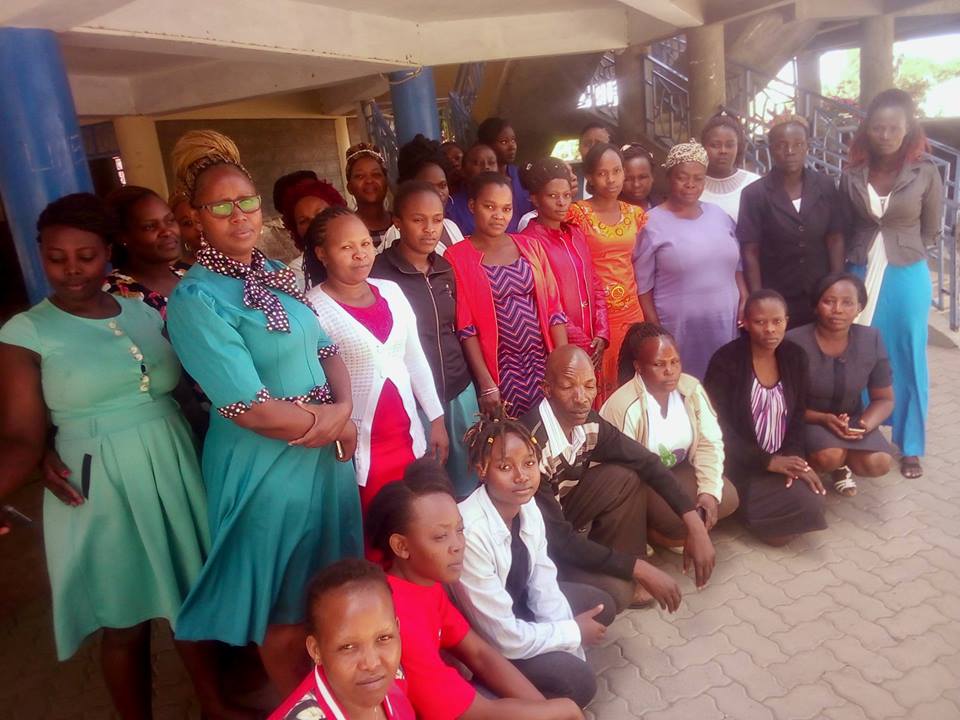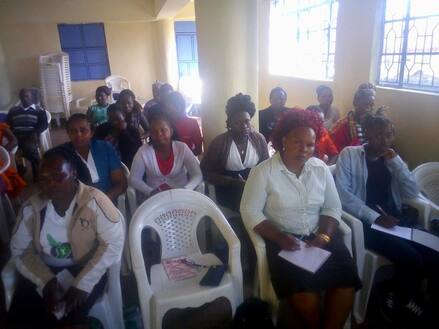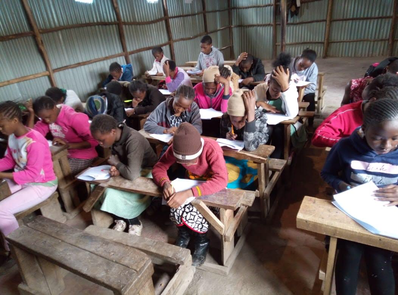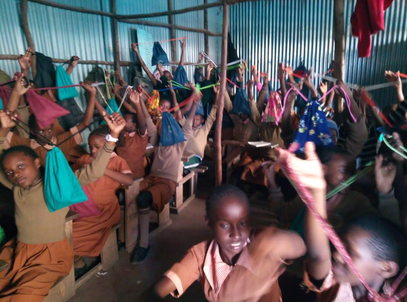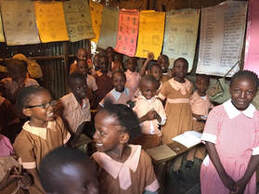
December 15th 2019
Siloam Project 2019 Review
It’s that time of the year again when we assess our accomplishments over the last 12 months and set goals for what we hope to achieve in 2020. We are currently planning the launch of a Slum Youth Empowerment Initiative in 2020. This will be an intensive one-day workshop on menstrual hygiene, positive manhood and life skills that all 800+ students at Siloam School in Nairobi’s Mukuru slum will take.
___________________________________________________________________________________________
Accomplishments
Imara Healthcare Centre:
In 2011, when we first started supporting the Imara Healthcare Centre, it was struggling to keep its staff and the premises were badly in need of repairs. With a partner from California, Imani Care International, we supported the cost of a major expansion and refurbishment of the clinic. With subsequent investment in repairs and the purchase of beds, bedding, equipment and the training of 14 community health workers, the Centre was able to get accredited for in-patient care by the National Hospital Insurance Fund (NHIF).
Then in 2016 we started investing in equipment for an Operating Room at the Centre which was opened in 2018. In attendance at the opening was a joint Canada - India Friendship Delegation let by Bill Gray. Our final investment was for a baby resuscitator and a baby incubator, which I had the pleasure of handing over when we were in Nairobi in April 2019. We also handed over some 500 baby hats knitted by Mona and other Canadian volunteers for new born infants at the Imara Centre.
With Rotary investment and the hard work of the management and staff, the Imara Healthcare Centre is now standing on its own financially and meeting the health care needs of the Mukuru slum community. We can be proud of that accomplishment as we turn our attention to help children at Mukuru’s Siloam Education Centre
Siloam Education Centre:
Over the last year we have facilitated six workshops, two with adults and four with students. One of the adult workshops was with the community health workers (CHW's) and the female teachers at Siloam school. It was on Menstrual Hygiene Management (MHM). The other adult workshop was on the transition of Boys to Men and was attended by members of the school's Board of Trustees and both male and female teachers. The main purpose of both these workshops was to ensure that the adults at the school were aware of what the students are learning and so that they would be available to answer their questions after the workshop is over. It was also an opportunity to test the workshop format.
Students completed a detailed questionnaire before the MHM workshops began and the preliminary results were not unexpected. Girls get their information about menstruation from friends or on the street and much of it is incorrect. The survey indicated that there is a widespread taboo about menstruation which undermines the confidence of girls. The plan to run workshops on menstruation appears to be meeting a real need.
One of the reasons for girls missing school during their cycle is the lack of access to sanitary wear and if they do have access, they had no place at school where they could change. That issue has been resolved with the construction of a new toilet block with a girls only changing area. The issue of providing access to sanitary wear has not been resolved and we will be investigating whether the community health workers could have a role making pads __________________________________________________________________________________________
Our Goals for 2020
By the end of the year 2020 we hope that all students at Siloam Kware school will have participated in the Slum Youth Empowerment Workshop. Our Team Leader, Scholastica Mwaka and Public Nurse Kate Lisake are currently developing the outline for workshops on Positive Manhood and Life Skills. We expect to start holding these workshops in the spring 2020.
The team will be reviewing the enrollment data that the school collects to see what can be learned about absenteeism and student drop outs.
Finally, we will be investigating what can be done to protect students from sexual violence. There is need for strategies to avoid sexual interference as well as support and counseling for victims of sexual violence.
___________________________________________________________________________________________
Travel Plans 2020
Mona and I are planning to visit Nairobi again in the spring 2020. That will give us an opportunity to attend one of the Slum Youth Empowerment workshops and interview some of the participants. We hope to stay again with our generous hosts, Barrack Odero and Isabella Olwenyo. Rotarian Isabella is a member of the Rotary Club of Syokimau in Machakis, near Nairobi. Once again we will bring infant hats and sanitary wear made by Canadian volunteers.
___________________________________________________________________________________________
Partnerships
Eganville Rotary is a small club and we rely on the contributions of generous individuals, non profit organizations and other Rotary clubs to sustain our work in the Mukuru slum. We acknowledge the support of the following donors
November 13th 2019
BACKGROUND
Siloam Education Centre is a registered community school with some 2,500 students. It is located in four different parts of the Mukuru slums. Mukuru Kware (Siloam A), where the project will be undertaken has about 800 students. The Director of Education is Joel Nzuki and the Headmistress is Janet Malika.
Siloam School was established with the goal of running a child friendly school for poor children in the slum. Many parents can’t afford school fees but the children are allowed to stay in school so that they are not out on the street where they could get into trouble.
Siloam Education Centre has demonstrated that it can meet its humanitarian goals while still achieving excellent academic results. Siloam A School has a 100% pass rate in the national exams for the Kenya Certificate of Primary Education.
BOOK DONATION 2017
In 2017, Rotary Eganville arranged for the donation of 225 story books to the school by the National Book Development Council of Kenya (NBDCK).
The mandate of the Council is to encourage a joy of reading in children. Authors are encouraged to use local names in their stories and to write books in local languages so that the settings are familiar to children.
RESEARCH PROJECT ON SLUM YOUTH EMPOWERMENT: 2018-20
The Rotary Club of Eganville Charitable Trust is undertaking a training and education project at Siloam School titled, “Education to Change the Lives of Children in a Nairobi Slum School”.
The project has the following six components:
1. SANITATION UPGRADE
Work to build a new toilet block and girls changing room was completed during the Easter 2019 holidays. Financial support for this part of the project was provided by the Rotary clubs of West Ottawa, Arnprior and Eganville, as well as Siloam School.
2. EDUCATION & ACCESS
Menstruation is a taboo subject and is generally not discussed between mother and daughter. At school it is given only cursory treatment in the curriculum. Yet it plays a major role in the lives of adolescent girls. Many stay home while having their period, so they miss up to 20% of their education.
To address this problem, workshops are being held to educate students about the role of menstruation in reproduction. They are also being trained in Menstrual Hygiene Management (MHM).
At the workshops all girls are given a Menstrual Kit containing reusable sanitary pads, a bar of soap, a pair of panties and a stainless steel bowl, all in a draw-string bag. The older girls are given the choice of using a menstrual cup, which will last 10 - 12 years, compared with 2 to 3 years for the washable reusable pad.
Student workshops have two main goals:
3. ADULT TRAINING WORKSHOPS
Two training workshops have been held with resource people in preparation for the workshops with Siloam students. This training was to make sure the Community Health Workers (CHWs) and school teachers understood the purpose of the training and would be available to the students if help is needed once the workshop is over.
The workshops are being organized by our team leader in Mukuru, Scholastica Mwaka. In 2015-16, she and the other Community Health Workers (CHWs) involved in this project, participated in a Rotary sponsored 8-day training course on Community Health and Home Based Care in partnership with the Imara Healthcare Centre.
Attendees at the March 2019 workshop were the Head Teacher at Siloam, 20 female teachers and 12 CHWs. The workshop was facilitated by Registered Nurse Kate Lusike. The intent of the workshop was to provide the necessary teaching skills and information to deliver 10 three hour workshops to the approximate 425 females of menstruating age at the school
The second workshop, held in June 2019, followed the proposed format of the Youth Empowerment Workshop. It was attended by 10 female teachers, 10 male teachers, six CHWs and four members of the Board of Trustees. It covered the proposed training for the boys on Positive Manhood, teaching them about respect and consent.
Siloam Project 2019 Review
It’s that time of the year again when we assess our accomplishments over the last 12 months and set goals for what we hope to achieve in 2020. We are currently planning the launch of a Slum Youth Empowerment Initiative in 2020. This will be an intensive one-day workshop on menstrual hygiene, positive manhood and life skills that all 800+ students at Siloam School in Nairobi’s Mukuru slum will take.
___________________________________________________________________________________________
Accomplishments
Imara Healthcare Centre:
In 2011, when we first started supporting the Imara Healthcare Centre, it was struggling to keep its staff and the premises were badly in need of repairs. With a partner from California, Imani Care International, we supported the cost of a major expansion and refurbishment of the clinic. With subsequent investment in repairs and the purchase of beds, bedding, equipment and the training of 14 community health workers, the Centre was able to get accredited for in-patient care by the National Hospital Insurance Fund (NHIF).
Then in 2016 we started investing in equipment for an Operating Room at the Centre which was opened in 2018. In attendance at the opening was a joint Canada - India Friendship Delegation let by Bill Gray. Our final investment was for a baby resuscitator and a baby incubator, which I had the pleasure of handing over when we were in Nairobi in April 2019. We also handed over some 500 baby hats knitted by Mona and other Canadian volunteers for new born infants at the Imara Centre.
With Rotary investment and the hard work of the management and staff, the Imara Healthcare Centre is now standing on its own financially and meeting the health care needs of the Mukuru slum community. We can be proud of that accomplishment as we turn our attention to help children at Mukuru’s Siloam Education Centre
Siloam Education Centre:
Over the last year we have facilitated six workshops, two with adults and four with students. One of the adult workshops was with the community health workers (CHW's) and the female teachers at Siloam school. It was on Menstrual Hygiene Management (MHM). The other adult workshop was on the transition of Boys to Men and was attended by members of the school's Board of Trustees and both male and female teachers. The main purpose of both these workshops was to ensure that the adults at the school were aware of what the students are learning and so that they would be available to answer their questions after the workshop is over. It was also an opportunity to test the workshop format.
Students completed a detailed questionnaire before the MHM workshops began and the preliminary results were not unexpected. Girls get their information about menstruation from friends or on the street and much of it is incorrect. The survey indicated that there is a widespread taboo about menstruation which undermines the confidence of girls. The plan to run workshops on menstruation appears to be meeting a real need.
One of the reasons for girls missing school during their cycle is the lack of access to sanitary wear and if they do have access, they had no place at school where they could change. That issue has been resolved with the construction of a new toilet block with a girls only changing area. The issue of providing access to sanitary wear has not been resolved and we will be investigating whether the community health workers could have a role making pads __________________________________________________________________________________________
Our Goals for 2020
By the end of the year 2020 we hope that all students at Siloam Kware school will have participated in the Slum Youth Empowerment Workshop. Our Team Leader, Scholastica Mwaka and Public Nurse Kate Lisake are currently developing the outline for workshops on Positive Manhood and Life Skills. We expect to start holding these workshops in the spring 2020.
The team will be reviewing the enrollment data that the school collects to see what can be learned about absenteeism and student drop outs.
Finally, we will be investigating what can be done to protect students from sexual violence. There is need for strategies to avoid sexual interference as well as support and counseling for victims of sexual violence.
___________________________________________________________________________________________
Travel Plans 2020
Mona and I are planning to visit Nairobi again in the spring 2020. That will give us an opportunity to attend one of the Slum Youth Empowerment workshops and interview some of the participants. We hope to stay again with our generous hosts, Barrack Odero and Isabella Olwenyo. Rotarian Isabella is a member of the Rotary Club of Syokimau in Machakis, near Nairobi. Once again we will bring infant hats and sanitary wear made by Canadian volunteers.
___________________________________________________________________________________________
Partnerships
Eganville Rotary is a small club and we rely on the contributions of generous individuals, non profit organizations and other Rotary clubs to sustain our work in the Mukuru slum. We acknowledge the support of the following donors
- Resuscitator/Incubator: The Rotary Clubs of Arnprior, Renfrew, Petawawa, Montreal, Sowerby Bridge (UK) and Eganville, as well as CUPE, a donation from a generous individual and a District 7040 Matching Grant.
- Siloam Toilet Block: Contributions were paid by Siloam School and the Rotary Clubs of West Ottawa, Arnprior and Eganville.
- Workshops & Training: The Rotary Clubs of Chateaugay, Chesterville, Malone, Montreal Lakeshore, West Ottawa and Eganville as well as the Women’s Inter Church Council of Canada (WICC) and the Fellowship of the Least Coin (the World Council of Churches,
- The Rotary Club of Eganville Charitable Trust gratefully acknowledges your support.
November 13th 2019
BACKGROUND
Siloam Education Centre is a registered community school with some 2,500 students. It is located in four different parts of the Mukuru slums. Mukuru Kware (Siloam A), where the project will be undertaken has about 800 students. The Director of Education is Joel Nzuki and the Headmistress is Janet Malika.
Siloam School was established with the goal of running a child friendly school for poor children in the slum. Many parents can’t afford school fees but the children are allowed to stay in school so that they are not out on the street where they could get into trouble.
Siloam Education Centre has demonstrated that it can meet its humanitarian goals while still achieving excellent academic results. Siloam A School has a 100% pass rate in the national exams for the Kenya Certificate of Primary Education.
BOOK DONATION 2017
In 2017, Rotary Eganville arranged for the donation of 225 story books to the school by the National Book Development Council of Kenya (NBDCK).
The mandate of the Council is to encourage a joy of reading in children. Authors are encouraged to use local names in their stories and to write books in local languages so that the settings are familiar to children.
RESEARCH PROJECT ON SLUM YOUTH EMPOWERMENT: 2018-20
The Rotary Club of Eganville Charitable Trust is undertaking a training and education project at Siloam School titled, “Education to Change the Lives of Children in a Nairobi Slum School”.
The project has the following six components:
1. SANITATION UPGRADE
Work to build a new toilet block and girls changing room was completed during the Easter 2019 holidays. Financial support for this part of the project was provided by the Rotary clubs of West Ottawa, Arnprior and Eganville, as well as Siloam School.
2. EDUCATION & ACCESS
Menstruation is a taboo subject and is generally not discussed between mother and daughter. At school it is given only cursory treatment in the curriculum. Yet it plays a major role in the lives of adolescent girls. Many stay home while having their period, so they miss up to 20% of their education.
To address this problem, workshops are being held to educate students about the role of menstruation in reproduction. They are also being trained in Menstrual Hygiene Management (MHM).
At the workshops all girls are given a Menstrual Kit containing reusable sanitary pads, a bar of soap, a pair of panties and a stainless steel bowl, all in a draw-string bag. The older girls are given the choice of using a menstrual cup, which will last 10 - 12 years, compared with 2 to 3 years for the washable reusable pad.
Student workshops have two main goals:
- Educate Siloam girls about the role of menstruation in reproduction and the changes in outlook, moods and attitudes during the transition through puberty.
3. ADULT TRAINING WORKSHOPS
Two training workshops have been held with resource people in preparation for the workshops with Siloam students. This training was to make sure the Community Health Workers (CHWs) and school teachers understood the purpose of the training and would be available to the students if help is needed once the workshop is over.
The workshops are being organized by our team leader in Mukuru, Scholastica Mwaka. In 2015-16, she and the other Community Health Workers (CHWs) involved in this project, participated in a Rotary sponsored 8-day training course on Community Health and Home Based Care in partnership with the Imara Healthcare Centre.
Attendees at the March 2019 workshop were the Head Teacher at Siloam, 20 female teachers and 12 CHWs. The workshop was facilitated by Registered Nurse Kate Lusike. The intent of the workshop was to provide the necessary teaching skills and information to deliver 10 three hour workshops to the approximate 425 females of menstruating age at the school
The second workshop, held in June 2019, followed the proposed format of the Youth Empowerment Workshop. It was attended by 10 female teachers, 10 male teachers, six CHWs and four members of the Board of Trustees. It covered the proposed training for the boys on Positive Manhood, teaching them about respect and consent.
CHW and staff attended the "train the trainers" workshops and then post workshop questionnaires werepart of the program evaluation process.
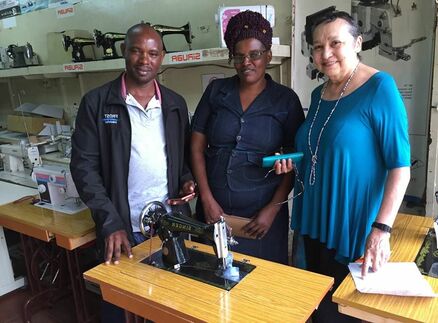 Shopping for the new sewing machine
Shopping for the new sewing machine
4. ACCESS TO SANITARY WEAR
One of the limitations in improving the attendance of girls in school is their inability to access sanitary wear because of its cost.. It is reported that some girls trade sex for pads. This puts them at risk for getting pregnant or for getting infected with HIV or other diseases.
To remedy this situation, volunteers in Canada made a considerable number of reusable sanitary pads, which will go in a Menstrual Kit, which will be given to the approximately 400 girls of menstruating age at the school. In addition, a sewing machine has been bought for the school and one of the parents has volunteered to help students make sanitary pads with fabric and supplies that have been purchased by Rotary. One of the CHWs, who owns a machine will also be making pads at home.
The Kenya government has a program to deliver sanitary wear to schools but according to the Director of Education, these resources never get to slum schools.
5. SLUM YOUTH EMPOWERMENT
The main goal of this project is to help youth become capable, caring and respectful citizens. It aims at getting them to set life goals and to work hard to achieve them.
At the Empowerment Workshops the boys and girls will meet separately in the morning. The girls will receive training on Menstrual Hygiene Management while the boys will receive training on Positive Manhood. This will encompass issues such as sexuality, consent and respect.
Lunch will be provided and the prospect of food is an incentive for hungry students to attend the Slum Youth Empowerment Workshop.
In the afternoon boys and girls will meet together to receive training on Life Skills. This will cover career choices, dating with dignity, alcohol and drugs, nutrition and money temptations.
6. EVALUATION
Evaluation is built into the core of the project. Students complete a survey questionnaire asking about their knowledge of puberty, reproduction and menstruation. The survey also asks questions about self esteem and confidence.
About two or three months after the workshop the students will be surveyed again to see how their knowledge has improved and for the girls, to see what their experience has been in managing their monthly period.
In addition to the questionnaires, the CHWs will analyze the school’s enrolment data to see if there has been any improvement in reducing absenteeism
PRELIMINARY FINDINGS
GENDER BASED VIOLENCE
One in three Kenyan girls has experienced sexual violence before the age of 18 (The Violence Against Children Report (2010)
Wangu Kanja, a survivor of sexual violence, started a Foundation to provide much-needed support to victims of gender based violence. She has set up a Survivors of Sexual Violence Network in all the 47 counties in Kenya. We will be meeting with Wangu to see what training is available and meeting with the school administration to understand better the dimensions of the problem
One of the limitations in improving the attendance of girls in school is their inability to access sanitary wear because of its cost.. It is reported that some girls trade sex for pads. This puts them at risk for getting pregnant or for getting infected with HIV or other diseases.
To remedy this situation, volunteers in Canada made a considerable number of reusable sanitary pads, which will go in a Menstrual Kit, which will be given to the approximately 400 girls of menstruating age at the school. In addition, a sewing machine has been bought for the school and one of the parents has volunteered to help students make sanitary pads with fabric and supplies that have been purchased by Rotary. One of the CHWs, who owns a machine will also be making pads at home.
The Kenya government has a program to deliver sanitary wear to schools but according to the Director of Education, these resources never get to slum schools.
5. SLUM YOUTH EMPOWERMENT
The main goal of this project is to help youth become capable, caring and respectful citizens. It aims at getting them to set life goals and to work hard to achieve them.
At the Empowerment Workshops the boys and girls will meet separately in the morning. The girls will receive training on Menstrual Hygiene Management while the boys will receive training on Positive Manhood. This will encompass issues such as sexuality, consent and respect.
Lunch will be provided and the prospect of food is an incentive for hungry students to attend the Slum Youth Empowerment Workshop.
In the afternoon boys and girls will meet together to receive training on Life Skills. This will cover career choices, dating with dignity, alcohol and drugs, nutrition and money temptations.
6. EVALUATION
Evaluation is built into the core of the project. Students complete a survey questionnaire asking about their knowledge of puberty, reproduction and menstruation. The survey also asks questions about self esteem and confidence.
About two or three months after the workshop the students will be surveyed again to see how their knowledge has improved and for the girls, to see what their experience has been in managing their monthly period.
In addition to the questionnaires, the CHWs will analyze the school’s enrolment data to see if there has been any improvement in reducing absenteeism
PRELIMINARY FINDINGS
- Young girls have little awareness of menstruation as it is a taboo subject and generally not discussed by mothers and daughters. Some 80% of young girls thought menstruation was “an abnormality or disease” and 15% had no knowledge of menstruation at all.
- Older girls who have started menstruating are often unaware of the function of menstruation or how to manage their period in a hygienic way. Often they get their information from unreliable sources.
- Some 85% of girls felt unclean during their period and had low self esteem and said they lacked confidence
- 75% of the girls belong to poor families where children go without food and clean water frequently, so are not in a position to buy sanitary wear.
GENDER BASED VIOLENCE
One in three Kenyan girls has experienced sexual violence before the age of 18 (The Violence Against Children Report (2010)
Wangu Kanja, a survivor of sexual violence, started a Foundation to provide much-needed support to victims of gender based violence. She has set up a Survivors of Sexual Violence Network in all the 47 counties in Kenya. We will be meeting with Wangu to see what training is available and meeting with the school administration to understand better the dimensions of the problem
Work has already started on this project with support from the Women’s Inter Church Council of Canada (WICC) and the Rotary Clubs of Ottawa West, Arnprior and Eganville.
OUR ACHIEVEMENTS IN THE LAST YEAR
The following is a summary of our achievements over the last year:
- SANITATION UPGRADE: Work was undertaken during April 2019 to build a new toilet block at the school. This contains five toilets for the girls and four toilets and a urinal for the boys. The toilets can be flushed to the main sewer line. This work was financed by Siloam School, in partnership with the Rotary clubs of Arnprior, West Ottawa and Eganville.
- FEMININE HYGIENE : Some 80 adolescent girls have been educated about the arrival of their monthly period and the role of menstruation in human reproduction. Two workshops were held to educate girls about the psycho-social aspects of puberty. They also learned how to manage their monthly period. They have also received a Menstrual Kit containing a holder and three reusable sanitary pads, a pair of panties, a bar of soap, and a washcloth, all in a drawstring bag.
Eighty Menstrual Kits have been given to Siloam School girls who attended the MHM workshops. We would like all 425 female students to receive the training and a Menstrual Kit.
- TRAINING: Two training workshops were held for adults. This included, the female teachers at the school as well as the Imara Community Health Workers (CHWs) and the school’s Board of Trustees. These workshops were intended to ensure that the teachers and CHWs understand the vision behind the training and are available to help students and ensure the continuity of the program after the workshops are finished.
There is another aspect of training that needs to be recognized and that is the training of the Imara Community Healthcare Workers (CHWs). They are a registered Community Based Organization operating in Mukuru. With their experience of conducting workshops on MHM, Boys to Men and Life Skills, the CHWs are well equipped to do similar kinds of studies for other schools or other social organizations. In order to assist them preparing applications or communicating project results, Rotary Eganville has provided funds to purchase a computer and scanner/printer.
- ACCESS TO SANITARY WEAR : The Gates Foundation Report, Menstrual Health in Kenya: A Country Landscape Analysis (2017) identified the lack of sanitary wear as an impediment for girls from poor families to complete their education. The Report notes that many young girls trade sex for pads, which puts them at risk of getting pregnant or contracting HIV or STD s
Mona Fox and a team of volunteers made a significant contribution to the project by making over 300 reusable sanitary holders and pads for Siloam students. A sewing machine has been purchased for the school so that students can make their own pads with the help of a volunteer parent.
WHAT STILL NEEDS TO BE DONE ?
- Planning Empowerment Workshops
It is proposed that students attend a full day training as follows: In the morning boys and girls would meet separately. The boys will learn about Positive Manhood and the girls will attend a workshop on the Management of Menstruation. In the afternoon the two groups will come together and learn about Life Skills.
- Refine Survey Methods
This process gathers information on learning and attitude change as well as the role of living condition in educational achievement.
- Assess the Impact of the Training
Preliminary results from the survey questionnaire suggest there is widespread ignorance about menstruation and that this ignorance undermines the confidence of girls.
- Access to sanitary wear is still an issue and it will be a challenge to the CHWs and the Management of Siloam School to come up with a plan to develop a sustainable and affordable supply of sanitary wear.
- Menstrual Cups
- Absenteeism and Drop-outs
The school collects enrollment data and the CHWs will analyze these data to assess trends in absenteeism and drop-outs. The questionnaire also asks questions about whether the student stays home during her period
- Positive Manhood and Life Skills
A questionnaire needs to be developed to determine attitudes about the various attributes of Positive Manhood and perceptions about important Life Skills
- Prevention of Sexual Violence
If there are sufficient resources, we will address sexual violence in the slum. One possible approach is to work with Ujamaa Africa, which has a very effective approach in addressing the issue. They use role playing in potential scenarios as a way how to avoid or prevent sexual aggression. Another approach that we will investigate is that of The Wangu Kanja Foundation, which has established a Survivors of Sexual Violence Network in all 47 counties of Kenya.
BUDGET
The budget is currently under development as we are waiting for information from Nairobi. However, it is expected to be about $10,000.
THE RESEARCH TEAM
The following are members of the research team:
- Alan Fox, Rotary Eganville, Project Director
- Scholastica Mwaka, Team Leader, Imara CHWs
- Kate Lusake, Registered Nurse, Facilitator
- Members of the Imara CHWs Team
ACHIEVEMENTS & PARTNERSHIP
Our achievements have been possible because of the financial support of our partners since 2011. They include: the Rotary Clubs of Arnprior, Chesterville, Eganville, Montreal, Montreal Lakeshore, North Renfrew, Pembroke, Petawawa, Renfrew, Shawville, Gananoque and ePremier.
We have also received financial contributions from the Rotary Clubs of Messina, Malone and Chateaugay (USA), the Rotary Club of Sowerby Bridge in the UK and the Rotary Club of Syokimau; near Nairobi. Valuable support has also been provided by District 7040 Matching Grants, La Fondation Coup de Coeur, the Women’s Inter Church Council of Canada and the Fellowship of the Least Coin (The World Council of Churches, Geneva).
We also receive donations from many loyal and generous individuals. We are proud of our partnerships and recognize them at every opportunity. Also, we issue Charitable Receipts to donors who are Canadian citizens.
WORKSHOPS
On October 24th 2019, the second in a series of Rotary sponsored workshop was held at Siloam School. The topic was menstrual hygiene management (MHM); something that is rarely taught about or spoken about in their culture. Knowledge and practice of MHM reduces school absenteeism and the social stigma attached to a generally taboo subject. Candidates learn the biology of human reproduction and coping skills to deal with menstruation. Each candidate was given soap, washcloth and basin with either a menstrual cup or reusable (washable) pads in a handy drawstring bag.
To monitor the success of the workshops, questionnaires were filled out before and after the workshop by the participants. The workshops were given by a health nurse. To facilitate this program, much preparatory discussion was held with school officials and community stakeholders. Also, initial planning for the project included the Rotary funded construction of private change facilities and washrooms complete with running water at the school. This project would not be possible if not for generous donation from our patrons, from supporting District 7040 Rotary clubs and a Fellowship of the Least Coin grant. This type of education is important to an evolving economy that needs educated women to assume leadership roles. Part of the project, yet to be finalized, is to educate the boys about acceptable behavior towards their female counter parts.
On October 24th 2019, the second in a series of Rotary sponsored workshop was held at Siloam School. The topic was menstrual hygiene management (MHM); something that is rarely taught about or spoken about in their culture. Knowledge and practice of MHM reduces school absenteeism and the social stigma attached to a generally taboo subject. Candidates learn the biology of human reproduction and coping skills to deal with menstruation. Each candidate was given soap, washcloth and basin with either a menstrual cup or reusable (washable) pads in a handy drawstring bag.
To monitor the success of the workshops, questionnaires were filled out before and after the workshop by the participants. The workshops were given by a health nurse. To facilitate this program, much preparatory discussion was held with school officials and community stakeholders. Also, initial planning for the project included the Rotary funded construction of private change facilities and washrooms complete with running water at the school. This project would not be possible if not for generous donation from our patrons, from supporting District 7040 Rotary clubs and a Fellowship of the Least Coin grant. This type of education is important to an evolving economy that needs educated women to assume leadership roles. Part of the project, yet to be finalized, is to educate the boys about acceptable behavior towards their female counter parts.
Post workshop questionnaires are part of the evaluation process. Attendees leave with important health knowledge and MHM kits in a handy draw-string bags
